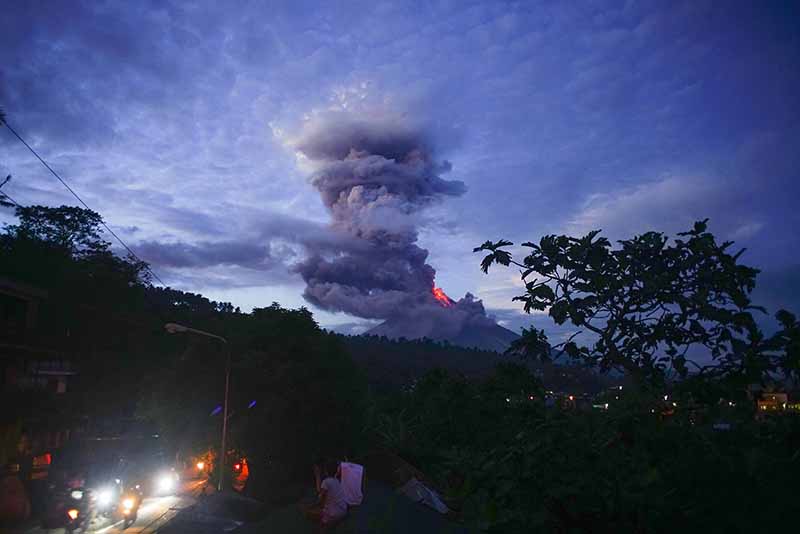Misery again for Mayon Volcano 'evacuees since birth'

Residents watch as the Mayon volcano spews lava as it continues to erupt, in Daraga town, in Albay province, south of Manila on January 23, 2018. Intense lava fountains shot like fireworks up to 700 metres (2,300 feet) into the air above Mayon, the Philippines' most active volcano, on January 23 as showering debris turned morning skies dark and spread fear among anxious residents. AFP/Linus Escandor II
GUINOBATAN, Philippines — Edna Orila has to sidestep human excrement as she looks for a space to sleep in the tiny schoolroom she shares with 55 other people seeking refuge from a spectacular -- but dangerous -- volcano in the Philippines.
Rising majestically above the region, the perfect cone of Mayon has been generating giant cauliflower clouds of superheated ash and bursts of fireworks-like lava for nearly two weeks, with experts warning of more.
A self-described "evacuee since birth", Orila has fled the fury of the volcano more than a dozen times since she was born 53 years ago.
She was only three years old when her parents first brought her to an evacuation centre during an eruption in 1968.
It never gets any easier.
"It's gruelling here. We are crammed with strangers. There are children, there are elderly," Orila said as she stood in the courtyard of a school in Guinobatan town, where evacuees' washing hung on clothes lines.
"There is a 93-year-old woman who removes her diaper at night and defecates in our room. I have to pass by her. But I try to understand because she is already old and sickly," Orila sighed.
Orila is one of 81,000 people who have been forced to leave their homes around the 2,460-metre (8,070-foot) mountain, which volcanologists say could blow its top -- violently -- any day now.
But as a family of farmers, tilling the rich volcanic soils of Mayon's slopes, they cannot afford to abandon their smallholding and she has left her husband to keep watch.
"I am afraid for him but he must keep watch. We had worked hard for our carabao. It cannot be left behind," she said of their water buffalo, a common draft animal in the Philippines.
"The troops are forcing him to leave but I told him to stay and if the volcano erupts, to just go inside the house and cover his face," she said.
'Live to survive'
Mayon has been spewing ash plumes up to five kilometres high that have turned day into night and blanketed roofs and trees. Residents outside the evacuation zone use facemasks and try to go on with their lives.
Philippine Institute of Volcanology and Seismology chief Renato Solidum said Friday only about a third of the debris that had swelled the crater has been ejected, meaning: "We have to expect that the activity will continue."
Romina Marasigan, civil defence office spokeswoman, told reporters the government expects it to last three months.
Many of those forced to flee are -- like Orila -- crammed into jury-rigged evacuation centres, where up to 80 people live in a classroom meant for 20 students, with no access to a proper toilet.
The result is a sanitation and public health nightmare.
"These are just urinals and are not meant for defecation," said health department nurse Aiden Ocfemia.
With no other way to relieve themselves however, many of the urinals have clogged up, she added.
An elderly evacuee and a child who both arrived at shelters suffering from pneumonia have since died, provincial health officer Antonio Ludovice told reporters Friday.
More than a thousand suffer from coughs and colds, 30 have diarrhoea and four others are down with chickenpox, Ludovice added.
Vegetable-killer
In nearby Ligao city, farmer Norberto Leona, 41, also sought refuge in a school where children gleefully bathed in the open near a firetruck delivering tap water.
The acidic volcanic ash has killed the vegetables at his farm, six kilometres from the crater, he said.
"This is my sixth time to evacuate. It just keeps happening and I am used to it," he said as he cradled one of his seven children.
Like Orila in the Guinobatan shelter, Leona said it never entered his mind to permanently move his family beyond Mayon's lethal embrace.
"Even if our home is in the danger zone, we have nowhere else to go so we have to tough it out here," he added.
- Latest
- Trending

































